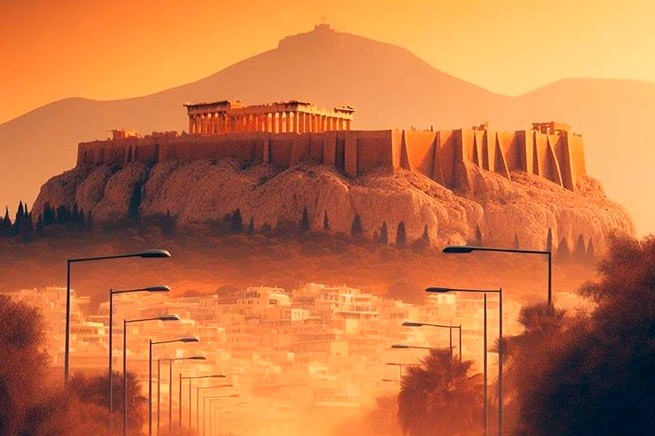The question of how Alexander the Great managed to conquer the greatest empire of antiquity in a few years has always caused many discussions. Die WELT points to ten factors that led to this.
How did Alexander the Great (356-323 BC) manage to accomplish the impossible in a few years – to create the greatest empire of the ancient world? There are many answers to this question, and over time there are more and more hypotheses, assumptions and theories. The Munich archaeological collection dedicated the exhibition “Alexander the Great – Ruler of the World” to the personality of the ancient commander, which examines the Alexander phenomenon from a biographical point of view. The exhibition consists of ten parts and shows the life of the ruler and commander, starting from his youth at the Macedonian court in Pele and ending with the mythological image that took shape after death – the image of an eternally young hero, a great leader, whom many were inclined to deify.
For this exhibition at the gallery in Rosenheim (Lokschuppen Rosenheim), 450 items from German and European collections were collected, which give an idea of the conditions in which Alexander the Great and his army found themselves during their campaigns to the east. The exhibition catalog, in addition to describing the exhibits, gives a brief overview of the points of view existing in modern scientific circles, from which ten reasons can be distinguished why Alexander became truly Great *.
1. Origin
Alexander was the son of Philip II of Macedon and the daughter of Olympias, the king of Epiroth. His father, who ascended the throne as the prince’s guardian, was a gifted general and prudent statesman who created a turbulent tribal kingdom on the edge of the Greek world under his rule. His mother participated in orgiastic cults, was domineering and oppressive. This shaped his childhood. It is believed that on the part of both parents, Alexander was a descendant of Hercules and Perseus, the great heroes of myths who became his role model.
Aristotle.
2. Education
Although Philip II had other wives, Alexander received the same education as a crown prince. Together with friends from aristocratic families, he went to school to the then not so famous scientist Aristotle. At the same time, his father took him with him on hikes. In the battle with the Greek city-states at Chirona in 338, he commanded a cavalry, the attack of which brought victory.
An artistic reproduction of the armor of Alexander the Great, based on the famous mosaic in Pompeii.
3. Army
When Philip II was killed in 336, his army was already in Asia Minor to repel the Persian army. More than two decades of military campaigns of Philip II made his army an impressive force: six regiments of heavy infantry – 9000 soldiers, armed with long spears; 3000 hypaspists, also with long spears, but more maneuverable; 6,000 lightly armed soldiers; 1200 gaiters (heavy cavalry), guards and 600 scouts. In addition, the army of Philip II included 7000 Greek hoplites, many mercenaries and several thousand horsemen.
4. Talent of the commander
Alexander was exactly the person who managed to properly dispose of this power. And the huge clumsy army of the Persian conquerors did not have a single chance against the Macedonians. At Gaugamela, Alexander, seeing that the Persians covered the battlefield with thorns against the cavalry, made a strategic maneuver and forced the enemy army to split into two parts, after which the Macedonian cavalry, avoiding the thorns, attacked the fortifications of the Persian king. Also, Alexander could trust his commanders and his army, which was ready to follow him to the ends of the world.
Coins with the image of Alexander the Great.
5. Pragmatism
Despite all his military superiority, not victories, but above all his policies, made Alexander the ruler of the world. He justified his rule not dogmatically, but by a clever analysis of the relevant circumstances and the pragmatic decisions that followed from them. It was guided by practical considerations that Alexander took over much from the system of government (satrapy) of the Persian Empire.
First of all, Alexander refused to turn Asia into a province of the Macedonian-Greek Empire. From the very beginning, he refrained from treating Asia as booty of war. Instead, he brought the local nobility closer to his court, which he secured places in the army and government bodies. Unlike his predecessors, Alexander treated the inhabitants of the conquered lands not as a conqueror, but as the legitimate ruler of their state, respecting traditions.
Ruthlessness
Of course, Alexander was not generous in terms of calculation alone. But the real opposition aroused extreme cruelty in him. When Thebes and Athens rebelled against him, shortly after his accession to the throne, he not only defeated their armies, but also destroyed Thebes. The Phoenician city of Tire, which was located on a rocky island and was considered impregnable, refused to submit, but after seven months of siege it was taken and then destroyed.
The leaders of the Old Macedonian faction, Parmenion and Filota, were killed. Alexander himself killed his friend Klitos, who saved his life on Granikos, during a feast, because he ridiculed his Eastern style of government. Some consider the return of the Macedonian army through the deserts of Gedrosia, which cost the lives of 45 thousand soldiers, as punishment for the riot on the banks of the Gypas.
Ruins destroyed by Alexander in 330 BC Palace of King Darius I in Persepolis
City building
It is believed that Alexander founded over 20 cities, from Egypt to India, and settled them with veterans and locals. However, they were supposed to serve not just as military bases, but as centers of Greek culture. Alexandria of Egypt was the most famous of them – one of the centers of trade and sciences of the ancient world. This and other cities founded by Alexander became a kind of connecting link between East and West.
Alexandria Egyptian
Development of sciences
Like Napoleon more than 2,000 years after him, Alexander had a large staff of scientists with him. Thus, his campaign became also a large-scale expedition, the purpose of which was to reach the ends of the world. Entire fleets were built to explore the connection from the Indus to the Euphrates. Scientists and philosophers described Asia, and the court clerk Callisthenes, Aristotle’s nephew, made sure that the world knew about it. Ultimately, however, Callisthenes fell out of favor, as he resisted the introduction of Persian customs at court (namely, the tradition of prostrating before the ruler), and was subsequently executed for alleged participation in a conspiracy.
To strengthen the unification of the Greeks and Persians, he introduced the Persian ceremony of worshiping the king, similar to what we see today in the worship of man before God. We can still see this ceremony depicted on a bas-relief from Persepolis.
Deification
When Alexander visited the Siwa oasis in the desert after the founding of the city on the Nile, the oracle of Ammon is said to have greeted him as “the Son of God,” to which he was entitled as the new pharaoh. This could only strengthen his confidence that he was following in the footsteps of Hercules. In addition, Alexander, as a great king, was automatically ranked among the cult figures. In his cities, he also received divine honors as a founder. The almost superhuman desire of his last months to unite Europe and Asia suggests that in the end he himself perceived himself more as an almost divine person than as a mere mortal (apparently from there comes the legend of his semi-divine origin).
The winner in the clothes of the vanquished.
Passionate desire
Ancient authors call it a day Greek word. “Πόθος”(longing desire) when looking for a motive for Alexander’s campaign. In fact, it was probably a deep desire that made Alexander strive even further, a desire to imitate the heroes of primitive times, especially Achilles. Because he wanted to prove that he really was one of them. Not in myths, but in reality. In northern Iran, he only captured a fortress because Hercules was said to have failed because of it.
Alexander’s empire disintegrated into several parts immediately after his death.
He wanted to go from the Indus to the Ganges, because the limits of the Ecumene, the entire inhabited world, would be reached there. And when he died, the army was ready to conquer Arabia, and later Carthage, because no one could ever do this. These plans have failed. But even without them, Alexandra’s “pofos” achieved his goal: no one had ever conquered a large empire.
* In Greece, Alexander the Great is called Alexander the Great.






More Stories
57 years ago, a junta of black colonels came to power in Greece.
On April 10, 1821, the Turks hanged Patriarch Gregory V at the Phanar gates
How did married couples divorce in Ancient Greece? Difference with modern divorces